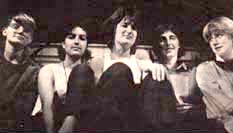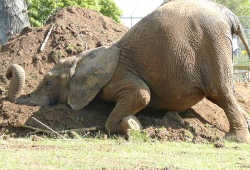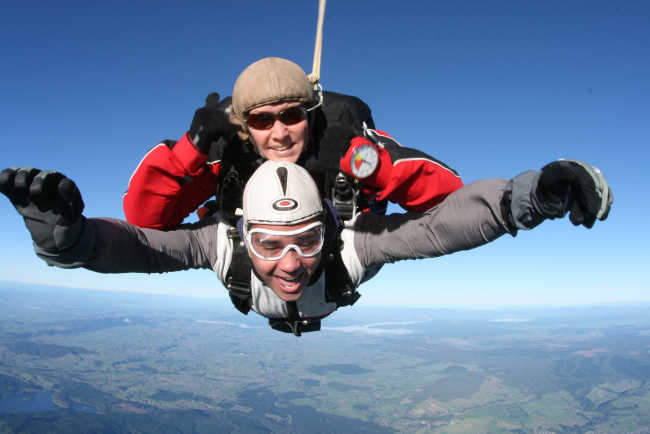Kathleen Gallagher – 21/7/00
Plays written by Kathleen Gallagher, Kate Winstanley and Gen Rippingale.
|
|
| Kathleen Gallagher Photo source Kathleen Gallagher |
Women’s Action Theatre (WAT) was born in December 1985 in Christchurch. Kate Winstanley and I met and started writing the script of what was to become Mothertongue. Katy Yiakmis, Annamarie Jagose and Alison Dalziel joined us and we began workshopping the script in the huge living room of Katy’s flat by Hagley Park. We workshopped it intensively, wrote and rewrote, worked and reworked the movement, the sound, the chant, the songs, the harmonies, the dance, the percussion.
The play develops from the birth of a woman, encapsulating fragments of her life, until her death. We opened at the Free Theatre on Rolleston Avenue, on 14 May 1986, on a simple black platformed stage, with Katy and Annamarie performing, Kate on percussion and Sharon Matthews responsible for the lighting. The audiences were large and appreciative, and the reviews glowing. In March 1987 we toured Mothertongue nationally, and in the course of the tour Fiona Roake took over from Annamarie Jagose as performer.
|
|
| From left, Kate Winstanley, Annamarie Jagose, Katy Yiakmis, Kathleen Gallagher and Sharon Matthews Photo source Kathleen Gallagher |
Annamarie Jagose and I wrote the second play, Herlot , which premiered on 17 October 1987, at the Free Theatre. Herlot examines the relationship between pornography and violence against women. In Herlot there is a mad judge and women sweeping, mopping, cleaning up messes. Out of the barrage of false images about women – we’re presented as decorative, stupid, passive and ‘having asked for it’ – we reclaim who we are: "I have been called these names to confuse me so I will not know who I am. I have been called these names as terms of abuse, as if it were wrong for me, a woman, to be a slut, to be a witch, to be a prude, to be a tomboy, to be a dyke, to be a virgin, to be aggressive. I am all of these things. I am a woman."
Offspring was first performed at the Parents Centre National Workshop in August 1988, and then at the Free Theatre in October 1988. Alison Dalziel was the producer, Katy directed, and Jen Rippingale and I wrote the play after interviewing sixteen mothers and four fathers who were actively involved in parenting young children. The aim – to take a look at pregnancy, childbirth and early child rearing for first-time parents.
Banshee Reel premiered at the Court Studio, Christchurch, on 1 September 1989. A theatre lighting technician (Sue Morrison) falls into the world of Biddy Godwin, a nineteenth century West Coast goldminer, and her leprauchan. Jen and I wrote this play, and Fiona Roake directed it. It is full of the West Coast, the story of the Irish, and it is about grief and death and letting go.
Kuwatawata premiered on 23 February 1990, at the Little Maidment, Auckland. Kuwatawata– ‘light seen through chinks’ – uses metaphor to describe the past of Te Wai Pounamu working through the eighteenth, nineteenth and twentieth centuries in the company of two huge birds – a kotuku and a moa. It examines the ways we have attempted to understand each other across cultures, where we have failed, and how we have succeeded.
Jacaranda was first performed in Dunedin at the Globe Theatre on 5 September 1991. The way we worked together on this play speaks of the commitment of all the people involved in Women’s Action Theatre. Kate Winstanley was living in Dunedin at the time. I was in Nelson. Kate and I wrote it together, sending chunks of script back and forward to each other, for editing, cutting and further writing. Fiona Roake travelled down from Christchurch to be joined by Cheryl Inwood as a performer and Lee Harris as musician. Jacaranda weaves together the fragmented memories of a ninety seven year old woman. The startling images and poetic text seem at first as incoherent as the ramblings of an old woman’s mind. Gradually the diverse elements of character, poetry, movement and song, evolve into the story of a passionate woman’s life.
Flying on Terra Firma, our final production, premiered in Christchurch on 4 November 1993. In this play each character represents a fragmented archetype, as well as personalities – the creator, the stranger, the lover, the dreamer. It is set in a bakery in Lyttelton in the late nineteenth century. Each of the women has an obsession which relates to flying, or to being swept away, either personally or in support of the dreamer’s passionate desire to fly. I was living in Nelson and I wrote and workshopped it with a cast of four.
The striking thing for me about Women’s Action Theatre is the light in the faces of the women in performance. Also the joy, the honesty and the fun we’ve had working together on intimate and difficult subjects. We worked to throw a new light in places where there had been none. To talk, to dance, to chant, to sing and move about things that hadn’t been much talked about in theatre up to that time – menstruation, growing up and what it feels like for us (Mothertongue); pornography and how it is a violence on us who sweep the floor and do the dishes (Herlot); what it feels like to have a baby, to be pregnant for the first time (Offspring); what it means to ‘lose your marbles’ – to grow old and suffer dementia (Jacaranda); what it means to slip through different realities and to touch each other’s pain (Banshee Reel); what happens when you dream of flying in nineteenth century New Zealand (Flying on Terra Firma).
Our members have held their interest in WAT. I was writing and directing, and Fiona Roake acting and directing throughout the nine years and we contributed substantially to every play except Kuwatawata. On average we took on board two new people for each new production.
Direct, polemical, delicate, committed, poetic, touching theatre that moves people so that their eyes dance and they walk out of the theatre taller and with a lightness and an understanding. Our work was by women, about women, for everyone. We worked to open people’s eyes to new ways of looking, of seeing, of touching base with themselves and each other.
The book Mothertongue contains a selection of four of the seven plays put on by Women’s Action Theatre – Mothertongue, Offspring, Banshee Reel, and Jacaranda. The book includes a review of each play written by a different reviewer after it was performed.
I have been deliberately light on scripting of action and movement in most places, in the hope that you who may wish to perform them feel free as we did to devise and to build whatever it is you are dreaming.
Mothertongue is available from Publishing Giant Press, PO Box 22-256, Christchurch for NZ$20.00 plus postage.






